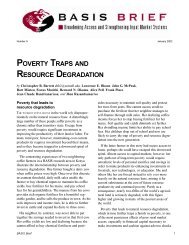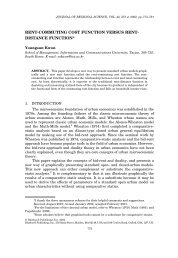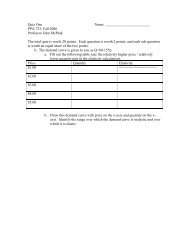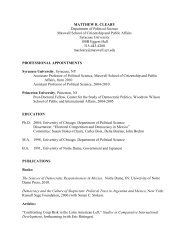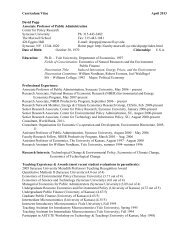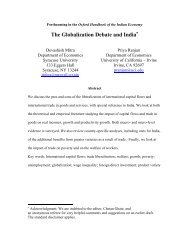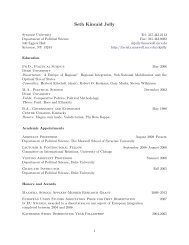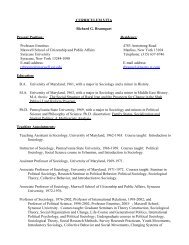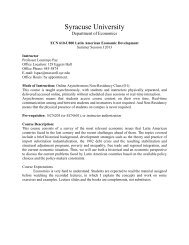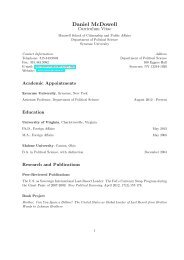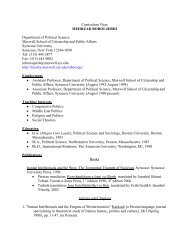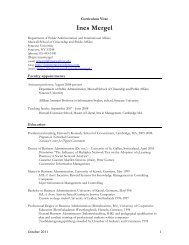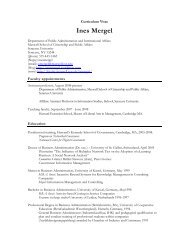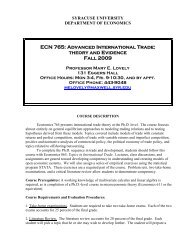The Anbar Awakening - Syracuse University
The Anbar Awakening - Syracuse University
The Anbar Awakening - Syracuse University
Create successful ePaper yourself
Turn your PDF publications into a flip-book with our unique Google optimized e-Paper software.
Downloaded By: [<strong>Syracuse</strong> <strong>University</strong>] At: 18:08 28 August 2008<br />
Saddam’s tribal strategy<br />
<strong>The</strong> <strong>Anbar</strong> <strong>Awakening</strong> | 73<br />
In Iraq, the Ba’ath Party’s relationship to the Iraqi tribes was equivocal from<br />
the beginning. Ideologically and rhetorically opposed to tribalism, the<br />
regime nevertheless practiced a form of state tribalism to remain in power.<br />
Members of Hassan al-Bakr and Saddam Hussein’s Albu Nasir tribe began<br />
to fill the security services in the 1970s, as did members of other favoured<br />
groups like the al-Jubburi. 25<br />
<strong>The</strong> Ba’ath Party in the 1970s had three main mechanisms to conduct<br />
this strategy. <strong>The</strong> first was the Ba’ath military bureau, which selected and<br />
organised party members for military service under the direction of the<br />
Beijat clan. <strong>The</strong> second was the security-service bureau, which was con-<br />
trolled by Saddam. <strong>The</strong> final and most obviously tribal instrument was<br />
the Committee of Tribes (Lajnat al-’Asha’ir), which was established to<br />
work with the tribes of the Sunni Triangle northwest of Baghdad, includ-<br />
ing <strong>Anbar</strong>, to secure the porous Syrian border. 26 <strong>The</strong>se three organisations,<br />
combined with booming oil revenue after the oil shock of 1973, enabled<br />
the Ba’ath Party (and particularly the canny Saddam) to place kinsmen<br />
in power (state tribalism) and buy the loyalty of other clans (auxiliary<br />
tribalism).<br />
<strong>The</strong> overall impact of tribalism on broader Iraqi society, however,<br />
remained muted in the 1970s. This was due to party efforts to weaken tribal<br />
power even as it sought to manipulate it, as well as the continuing mod-<br />
ernisation and urbanisation of Iraq. Land reform was a major part of this,<br />
as the Ba’ath regime redistributed land or gave it to new peasant collec-<br />
tives. Tribesmen, including future sheikhs, often joined the Ba’ath Party and<br />
took up modern professions such as engineering. 27 <strong>The</strong><br />
rural tribes as the British knew them in the 1920s and<br />
1930s had effectively ceased to exist, mostly becoming<br />
rural–urban hybrids.<br />
Events of the late 1970s and early 1980s would force<br />
the Ba’ath Party to increase its reliance on the tribes of<br />
<strong>Anbar</strong> for internal security. <strong>The</strong> Iranian revolution of<br />
<strong>The</strong> rural tribes<br />
had effectively<br />
ceased to exist<br />
1979 seemed to provide Saddam with a golden opportunity to get even<br />
with an Iran that under the Shah had exploited Iraqi weakness. Now in sole



